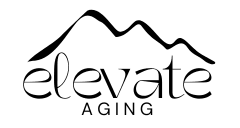elev"a"te - Alzheimer's Awareness
Alzheimer’s Disease and cognitive decline are areas of special significance for me. My years of work as an Occupational Therapist in the long term care industry and my family’s history with Alzheimer’s Disease(AD) contribute to my continued interest and support of people with this diagnosis. It’s likely you know someone with AD. Nearly 7 million Americans are living with AD according to the Alzheimer’s Association and Centers for Disease Control and Prevention. Furthermore, by 2050 this number could reach 13 million. Eventually, 45% of people affected with AD will require nursing home care, like my mom. Lastly, over 11 million unpaid caregivers provide support to people with Alzheimer’s, like my dad.
I believe Alzheimer's Awareness deserves its own letter in the word ELEVATE because our daily decisions can impact not only our own cognitive health but the cognitive health of our loved
ones. While we await a cure, we can leverage technology and research to learn ways to slow the disease's progression. Alzheimer's Disease (AD) is linked to impaired insulin signaling in the brain, contributing to neurodegeneration. Metabolic dysfunction, Beta-Amyloid buildup, and oxidative stress are interconnected and warrant concern, even as more research is needed. Notably, 80% of AD patients have type 2 diabetes or glucose intolerance, and both conditions share common inflammatory signaling pathways. These factors highlight the potential for lifestyle choices in managing AD more effectively through diet and activity.
Foods rich in antioxidants will help to combat oxidative stress, a known factor in Alzheimer’s related neurodegeneration. Carotenoids, such as carrots, tomatoes and sweet potatoes, have anti-inflammatory effects and can be linked to Beta-Amyloid reduction. Furthermore, carotenoids offer neuroprotection and support synaptic plasticity. Molecular hydrogen water has natural antioxidant properties, high PH, and tiny water molecules making it more easily absorbed,
including effective penetration of the blood brain barrier. Please refer to the Products tab for further info about Kangen Water™ Ionizer and Ukon (turmeric products)
Search Dr. Corinne Allen and Kangen Water™
As an Occupational Therapist, I realize that diet and exercise are not the only ways to support cognitive health. While this site is devoted to all of the ways to help you create a more vibrant
and healthy future, I’d like to pivot and share some of my favorite interventions that I have incorporated into my favorite therapy sessions. We all may visit or care for someone with Alheimer’s at some point in our lives and I believe there is no greater gift than to help create a positive interaction and exist in the moment with someone who has AD. Once when I was feeling discouraged at work, a co-worker reminded me that you never know what impact you may have on someone, even 10 minutes of positive exchange can impact a person’s emotional state. Through my approach and mindset I strive for engagement, laughter and purpose. All individuals require an individualized approach and we always need to be cognizant of our therapeutic use of self, how our words and actions affect others. I will refer you to Teepa Snow’s website and her gem stages. About Dementia - Positive Approach to Care Her description of the stages of Dementia may offer insight when caring for or visiting someone with AD. Dementia is variable; moods, emotions and interactions can be unpredictable. Patience and kindness will go a long way.
Below are the categories I always consider when working with individuals with cognitive impairment, regardless of age or stage.
- Sensory rich activities
- Reciprocal games and midline crossing
- Music to support rhythm and timing
- Salient activities
For optimal cognitive health, the right and left hemispheres of the brain need to work together, midline crossing activities will strengthen this communication, impacting coordination, focus, and balance. One of my favorite examples of midline crossing activity is cross crawls. This can be done seated or standing. Raise your left knee and touch your right elbow to your left knee.Then raise your right knee and touch your left elbow to your right knee. Repeat the movement as needed. There are many variations and modifications of this activity. Below are links that include other examples of brain boosting activities with varying degrees of difficulty. Great fun for all ages!
TOP 4 Brain Exercises for COORDINATION
Multisensory experiences are important as they promote neuroplasticity, helping the brain compensate for declining senses as we age. Certain smells, for example, can evoke memories or reduce anxiety. Tactile sensitivity declines with age as well, one's sense of body position and awareness can become diminished, leading to higher risk for falls. Increased touch or gentle joint compression can be beneficial prior to activities or walking, this tactile input can bring increased awareness to the body part and help the individual feel more grounded.
15 stimulating sensory activities for seniors with dementia or Alzheimer’s - Vytality At Home
I believe it is a true gift to give back to those in the final stages of their lives. Many individuals are often overlooked and misjudged. It is impossible to understand another person's mind entirely, and no one should ever be counted out. The human brain is remarkable, and the connections we make with people are significant. My experiences and interactions within long-term care settings have profoundly shaped me, driving me to create this site and contribute relevant content, stimulate ideas and introduce beneficial products. I truly believe there is nothing more important than our relationships with each other and growing and learning together as we age. Please feel free to email at any time with additional questions or comments.
